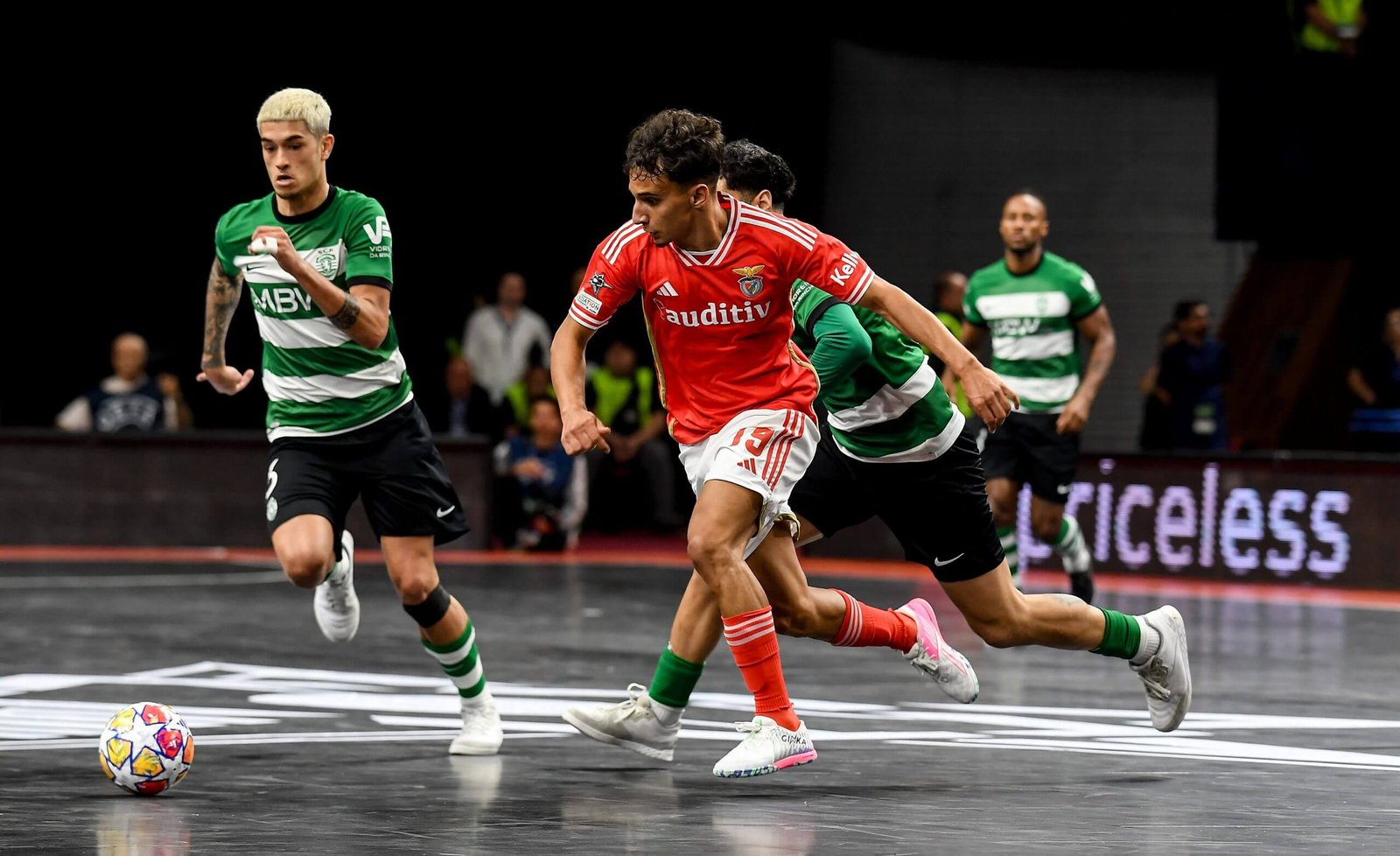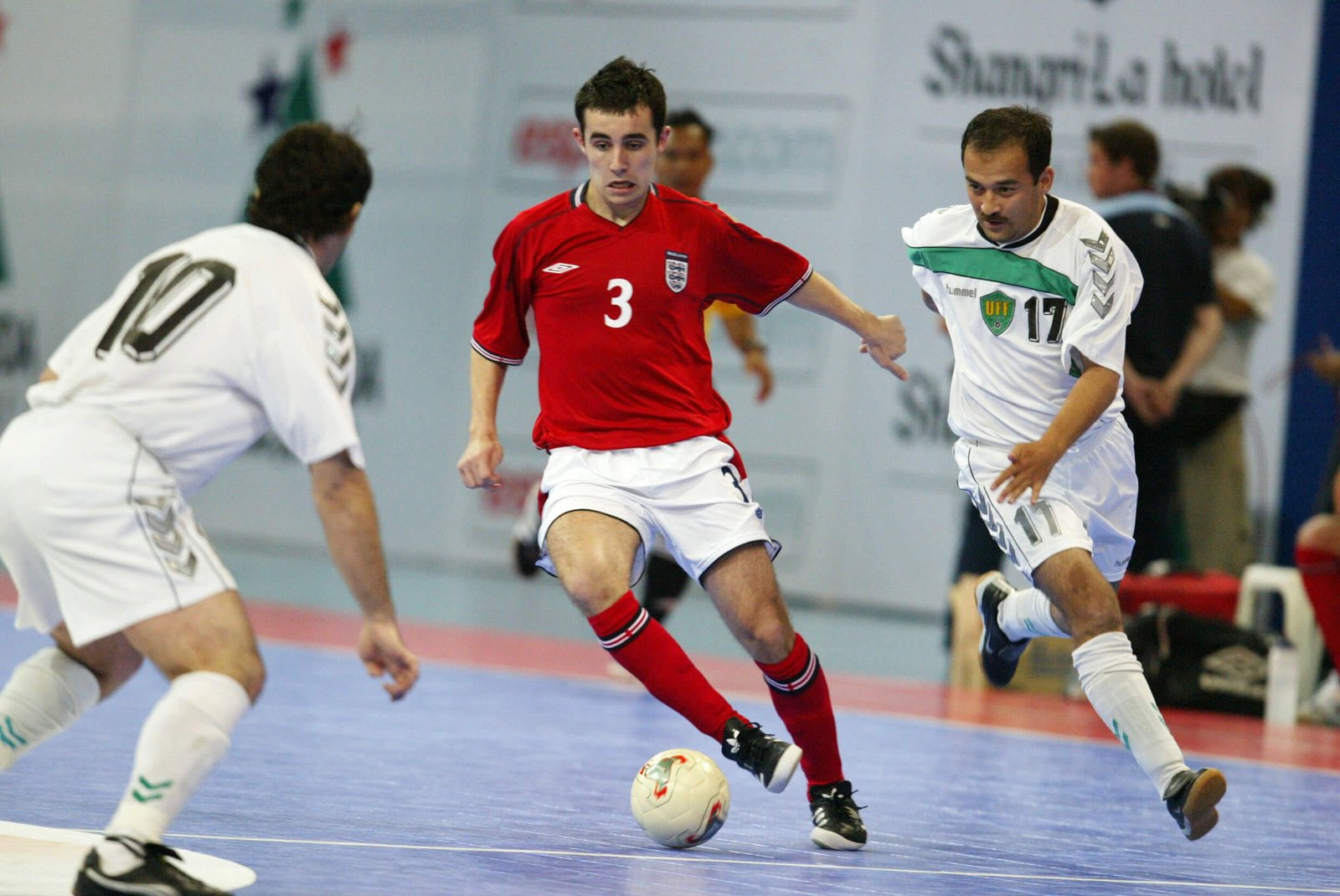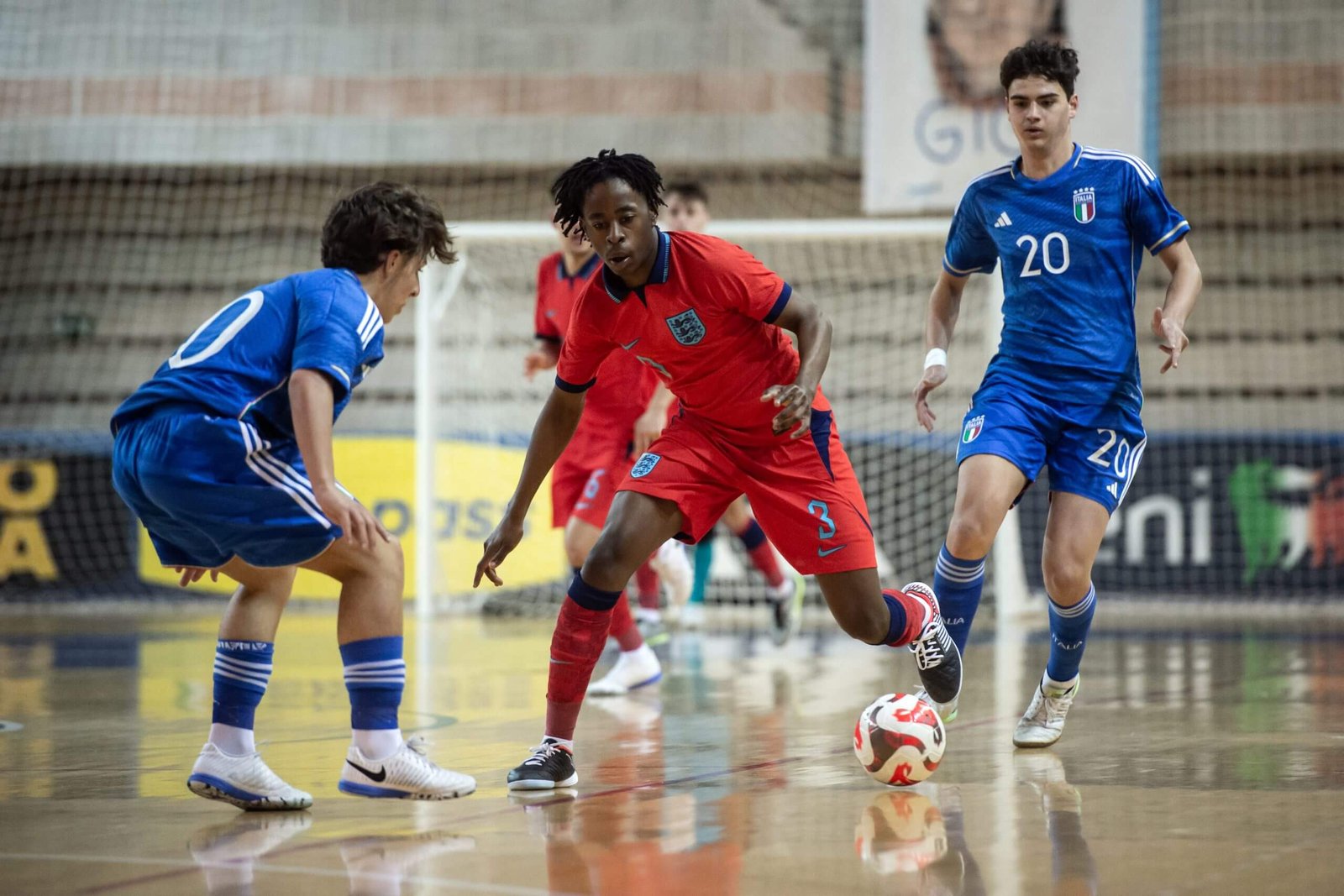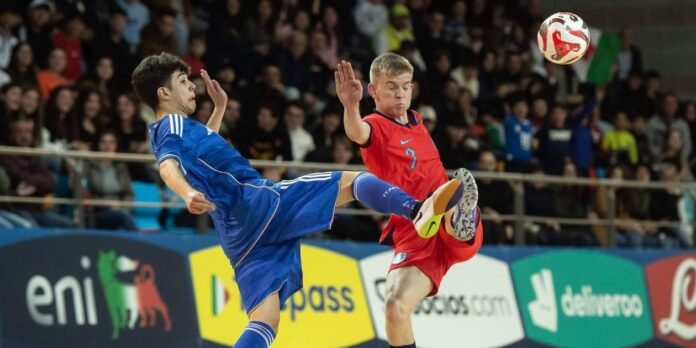Don’t panic, but you’ve completely missed a men’s World Cup.
In October, Brazil won their sixth Futsal World Cup, beating Argentina 2-1 in the final, hosted in Uzbekistan. England weren’t there — they’ve never made a Futsal World Cup or UEFA Futsal Championship — because they didn’t have a team in qualifying.
The rule is that successful footballing nations are good at futsal. Brazil, Spain, Argentina and Portugal boast silverware across the two sports. England are an exception: in 2020, the Football Association withdrew almost all financial support and cut the national teams entirely.
Now, the recovery is underway. Once the nation’s fastest-growing sport, English futsal now has under-19 and senior teams trying to qualify for their respective European championships in the next two years, all under the auspices of England Futsal, which has assumed control from the FA.
There are high-profile futsal graduates in professional football, too, from West Ham United defender Maximilian Kilman to Neil Saunders, director of football at the Premier League, and Michael Skubala, the one-time England futsal manager now in charge of League One Lincoln City.
Maximilian Kilman went from futsal to professional football (Richard Pelham/Getty Images)
Ahead of England’s qualifier against Bosnia & Herzegovina this evening, The Athletic spoke to many figures who helped shape futsal in England to explain how the sport has evolved and what the future may hold.
Futsal comes from a fusion of Spanish/Portuguese words for football (futbol) and hall (sala/salon), and its origins are traced to Uruguay in the 1930s.
There are four outfielders and one goalkeeper, unlimited substitutions, no offside, and kick-ins with a four-second limit. It is played indoors on a 40-x-20-metre pitch (the same dimensions as a handball court) and the ball is slightly smaller than a football, with less bounce.
England was one of the last nations to establish a national team, in 2003, when FIFA held its first Futsal World Championship (now Futsal World Cup), 14 years after it took charge of the sport.
Graeme Dell, England’s first-ever head coach, remembers it well. “I got a phone call from the FA saying, ‘We want to talk to you about coaching our five-a-side team’,” he recalls. “I thought someone was taking the p*** — we don’t have a five-a-side team!”
He recalls that there “was pressure to enter a team into a UEFA competition. We put a team together and headed off to Albania (2005) for the Euros qualifiers. That was all a bit crazy”.
England lost against Albania and Cyprus in those preliminary qualifiers by an aggregate score of 16-10 in what Dell remembers being a “harsh” reality check, but he was still appointed as England’s first national team coach. What was his remit? “Learn about the game, feed back, see what we can do. Everybody thought we would do more and better than we did.”
There were some horror results — including a 24-1 defeat to Portugal in the Four Nations tournament in 2004 — but progress was always likely to be slow in a country that lacks a ‘court culture’, partly because the temperate nature means outdoor sports can be played year-round.
John Tapia Owens, an assistant coach for England Futsal’s senior men’s team, grew up in Spain and England. “Futsal and indoor sports are embedded into the community in Spain — a village or town will have its own courts,” he says. “Here (England), leisure companies own the courts. That community centre in Spain is really a thriving point for those sports to take off.”
As of 2014, there were only five ‘purpose-built’ futsal centres in England, and those were disproportionately located in the north, with none in London.
“In Spain, every little village has an indoor sports hall with 500 fans,” says Doug Reed, a former England international who played futsal professionally in Spain, Croatia and Cyprus.
“That lack of indoor venues is a massive block,” says Reed. “The venues aren’t made for spectator sport. You might get one, but it’s a hall and there’s one meter of space between the outline of the pitch and the wall.”
English futsal also lacked the infrastructure seen in many continental European countries, where clubs boast teams in different sports. The ‘big three’ in Portugal (Porto, Sporting and Benfica), Bayern Munich (Germany), Feyenoord (the Netherlands), Fenerbahce, Galatasaray (both Turkey), Djurgardens (Sweden), Real Betis (Spain) and Grasshopper (Switzerland) are all best known for their football but they also have professional teams in a court sports — futsal, volleyball, basketball, handball and floorball, for example.

Benfica and Sporting have renowned futsal teams (Matt Browne – Sportsfile/UEFA via Getty Images)
Chelsea briefly had a futsal team, but that was associated with their foundation and has since folded. Maidenhead United of the fifth-tier National League established a futsal team in June 2023 with a merger of two pre-existing teams. But those are exceptions in England where, as Reed observes, the unparalleled “depth of professional and semi-professional football takes the talent pool”.
The dominant football culture means fewer players get into futsal, while those that do are given little incentive to stay because they can earn more playing non-League football.
Former England head coach Pete Sturgess — who describes futsal as football’s “little brother” — saw his role split between men’s head coach and under-five-to-11 developer. On any given weekend, he “could be working with our national team at St George’s (Park), then on Monday, be working with the under-eights group”.
It is difficult to imagine Thomas Tuchel signing up to such terms when he begins his men’s football senior head coach role in January, but England had to grow futsal at both ends of the participation pyramid.
Sturgess outlines an average England camp in the 2010s: “We’d meet up on a Friday, train Friday night, train Saturday, but I’d lose three or four because they played non-League football.
“They’d return on Saturday night and train again on Sunday morning. These were supposedly the best futsal players in England and they were having to miss a camp to go and play football.
“They stood on the pitch and the ball just kept going over their head, because that’s the type of game that we played in non-League. Yet in futsal, it’s about rotations, technical ability, decision-making, the speed of movement of you and the ball. It was so opposed.”
The National Futsal League, set up in 2008, accelerated the sport’s growth, with London-based Helvecia and Baku United winning the first seven league titles between them.
In the late 2000s, Sturgess says, there were “real pockets of futsal”.
He continues: “Particularly in London, where there were immigrant communities who brought that court-based mentality. They really kept the game going nationally, but from a selection point of view, none of them qualified for England.”
It meant the national team lagged behind. Top English players improved but it reduced court time for the next generation of homegrown players.
England’s first qualifying win eventually came in 2010, at their fourth attempt, when Sturgess had replaced Dell as head coach.
“The real turning point was in the Sturgess era,” says Dell. “We did a lot of the groundwork, learning, identifying the type of player we needed, playing against other teams. We had lots of knowledge.
“Pete was able, because he was full-time at the FA, to start to apply (those learnings) with a more stabilised group of players and move on to a different level.”
Finally, at the seventh attempt, England made it out of the preliminary rounds for the first time in 2014, beating Cyprus 2-1 and hosts Lithuania 4-3.
“Players were running outside and diving in the snow, because it was what everybody had worked so hard for,” recalls Sturgess. “It gave us credibility to say, ‘There’s value in keeping this going’.”

England played at the 2003 World Futsal Championship but progress has been tough (Stanley Chou/Getty Images)
England were dispatched in the main qualifying round, losing all three games against Slovenia (5-2), Ukraine (7-0) and Turkey (4-3), but it was genuine progress for an amateur sport still primarily played at universities.
A 2014 study from Sheffield Hallam found that 46 per cent of futsal players in England first heard of the sport at university — Reed and Sion Kitson are examples. Fittingly, Sheffield Hallam were England’s representative in the 2004-05 UEFA Futsal Cup (now the Champions League), after winning the inaugural FA Futsal Cup in 2003.
Fast forward a decade and England are a consistent presence in the main qualifying rounds for major tournaments, although winning once they have got there is proving a challenge. In 2018, the FA created its first futsal-specific strategy and included it in the National Game Strategy, the overarching plan for developing all footballing formats. Skubala, England Futsal head coach at the time, called it a “landmark moment”.
Futsal suited the aims of the Elite Player Performance Plan, launched in 2011, to develop “more and better” English footballers and, ultimately, tournament-winning teams. England, historically, lacked technicians and were tactically simple, and over-reliant on physicality — the exact things futsal forced players and teams to not be.
The six-year ‘Fast Forward with Futsal’ plan aimed to ensure “every young player experiences futsal”, while setting targets for participation and coaching qualifications. It led to the establishment of the National Futsal Series (a rebranded national league) with the ambition of launching a senior women’s team and lifting the men’s team from 54th in the world into the top 20.
Yet, almost two years after the plan was launched, in September 2020, the FA pulled almost all the futsal funding (from an initial seven-figure budget) and dropped the national teams, as part of Covid-19 pandemic cuts.
In a statement explaining its decision, the FA said: “We have to prioritise our core functions that regulate and serve English football and also have a duty to support our men’s and women’s senior teams in their efforts to win major tournaments. This has led to difficult financial choices, but ultimately has forced us to focus more than ever on our key priorities.”
“It was demoralising — it destroyed three or four years of really good work,” says Dell. “We had a futsal strategy, an increase in player numbers. All of that was lost.”

England’s futsal development was stymied by the Covid pandemic, after which funding was cut (Jan Kruger/Getty Images)
England had just played Italy in a 2020 World Cup main round qualifier when the news was confirmed: they only played two more games after that tie, both preliminary round Euro 2022 qualifiers — a 1-1 draw at home to Israel and a 3-0 defeat in Moldova in February 2020. The FA withdrew the national teams before the qualifying round play-off against North Macedonia.
The FA could point to the success of their football teams — the Lionesses winning Euro 2022, a year after the men’s team were Euro 2020 runners-up, and men’s age-group success — but there was little doubt that it came at futsal’s expense.
Sturgess, who retired last year, is optimistic. “In hindsight, it has given an opportunity for the game to have a rebirth,” he says.
England Futsal was launched in December 2022 as an independent non-government organisation that was licensed to manage the game in partnership with the FA for an initial five years, including a two-season trial period for under-19 men’s and women’s national teams.
It has a fraction of the budget that the FA used to, which makes it challenging to finance elite national sides and invest in grassroots simultaneously.
For instance, England’s senior women — a team set up this year — had to crowdfund their 2025 World Cup qualifiers in Moldova last month. The men’s team need to scrape together £95,000 ($120,000) for their Euro 2026 qualifiers starting in December.
On the court, things are better. The women beat Moldova 8-0 and were competitive in defeats to Finland (5-2) and Slovenia (4-2), sending them home from Euros qualifying in the preliminary rounds, but positive for a history-making team.
For the first time, England men are ranked high enough to bypass the preliminaries and go straight to the main round of Euros qualifying, although that means they face high-calibre opponents. One of them, Spain, are ranked second in the world — England are 82nd, between Malaysia and Jordan.
The biggest success was the under-19 boys last year, who were the first England team to play for three years and were only put together in January 2023 as they waited for administrative checks for England Futsal to be licensed.

England reached the 2023 European Championship main round (Ivan Romano/Getty Images)
“We had 12 days, we talent IDed about 25 to 30 players, and went to Lithuania in the prelims — no expectations,” Kitson says.
They faced Lithuania, Estonia and Malta and won all three matches. “It added a bit of buzz,” adds Kitson. “To beat Lithuania 3-0 in front of their crowd was a real marker of experience and maturity of the young lads.
“It was important for England Futsal. That was their first running of a national teams programme. To show the FA we can be trusted, deliver good experiences, support players.”
Once again, the main-round group — this time featuring Italy, the Czech Republic and Turkey — was too great a challenge but, again, hardly a surprise given the disparity in experience and exposure of the respective squads.
Gaining that experience is the next step. Reed says 20 to 30 international games are needed just to get comfortable. “Futsal was all about experience, now these nine- and 10-year-olds, once they reach senior level at 20, they’ve already got 11 years experience whereas I had zero.”
England had a futsal watershed moment in August, when Manchester Futsal Club — who have multiple Premier League players, including Kobbie Mainoo, as alumni — became the first English side to host Champions League qualification games.
Two marginal defeats meant, despite a 6-2 win over Istanbul Sisli, they went out in the preliminaries, on competition debut. Baku, in 2014-15, remain the only instance of an English side reaching the Champions League elite round, which is effectively the group stage proper.
The hope is that futsal can flourish as a sport in its own right, not just as a football development tool — even if there are plenty of futsal graduates in football.
“I don’t think we make the most of it — it’s just mentioned almost in passing that someone like Maximilian Kilman played futsal,” says Sturgess.
“The things he learned, was able to practise and get massive repetitions of (in) futsal, must have helped him secure a contract as a professional football player. He’s a great example of what is possible.”
(Top photo: Ivan Romano/Getty Images)
Read the full article here


